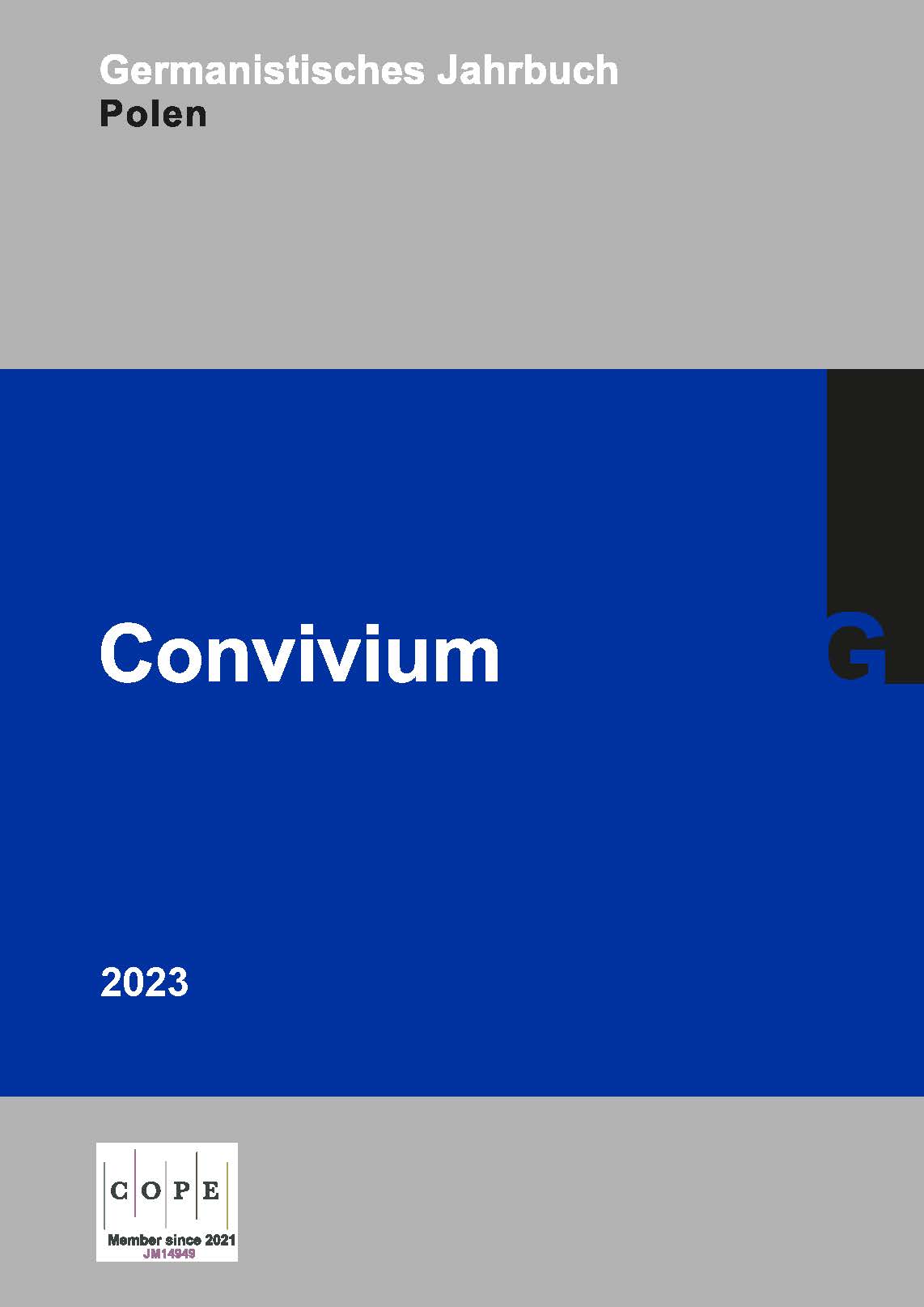Platforma Moodle w nauce języka niemieckiego jako drugiego języka obcego
DOI:
https://doi.org/10.18778/2196-8403.2023.02Słowa kluczowe:
kształcenie na odległość, zasoby elektroniczne, Moodle, język obcy, kompetencje socjolingwistyczne, kompetencje komunikacyjne, kompetencje zawodoweAbstrakt
Artykuł dotyczy metodologicznych zasad organizacji blended learningu w nauce języka niemieckiego jako drugiego języka na Wydziale Lingwistyki Stosowanej Narodowego Uniwersytetu „Politechnika Lwowska”. Autorki podsumowują doświadczenia krajowych i zagranicznych badaczy w zakresie wdrażania technologii blended learning i nauczania na odległość w wirtualnym środowisku Moodle.
Stwierdzono, że kursy języka niemieckiego opracowane i oferowane na platformie e-learningowej przyczyniają się do rozwoju kompetencji komunikacyjnych i gotowości do komunikowania się w różnych dziedzinach życia publicznego. Badanie pokazuje możliwość wykorzystania platformy Moodle do tworzenia kursów języków obcych przez studentów. Platforma oferuje możliwość prezentacji online materiałów dydaktycznych w grupie, w miejscu pracy studenta. Oferuje także wsparcie metodyczne w postaci materiałów audio i wideo. Proces uczenia się jest wynikiem współpracy między nauczycielami i studentami online przy użyciu technologii informacyjnych, takich jak wideokonferencje, Czaty, fora i poczta elektroniczna. Za pomocą platformy Moodle opracowano system obejmujący automatyczną kontrolę i samokontrolę nabytej wiedzy, kontrolę początkowej i końcowej oraz elektroniczny dziennik ocen, który poprawia efektywność uczenia się i zwiększa motywację uczestników tego typu nauki. Badanie to dowodzi, że elektroniczna platforma do nauki języka obcego jest skuteczna dla obu stron procesu: nie tylko dla uczących się, ale także dla nauczycieli.
Bibliografia
ASOJANTS, PETER (2014): Методичні переваги використання інформаційно-комунікаційних технологій у процесі формування англомовної професійно орієнтованої лексичної компетенції [Methodological advantages of using infor-mation and communication technologies in the process of forming English-speaking professionally oriented lexical competence]. In: Теоретичні питання культури, освіти та виховання. [Theoretical issues of culture, education and upbringing] 49:90-97: http://nbuv.gov.ua/UJRN/Tpkov_2014_49_25 (09.11.2022).
Google Scholar
BESKORSA, OLENA (2017): Система Moodle як засіб організації змішаного навчання практичної фонетики німецької мови [Moodle system as a means of organizing blended learning of practical phonetics of the German language]. In: Інформаційні технології та засоби навчання. [Information technologies and learning tools] 62(6):86-97: https://journal.iitta.gov.ua/index.php/itlt/rticle/view/1832/1282 (09.11.2022).
Google Scholar
DOI: https://doi.org/10.33407/itlt.v62i6.1832
BEZLYUDNY, OLEKSII (2019): Досвід використання змішаного навчання на заняттях з англійської мови в закладах вищої педагогічної освіти [Experience of using blended learning in English classes in institutions of higher pedagogical education]. In: Інформаційні технології та засоби навчання. [Information technologies and learning tools] 73(5):86-100: https://journal.iitta.gov.ua/index.php/itlt/article/view/2669/1566 (02.12.2022).
Google Scholar
DOI: https://doi.org/10.33407/itlt.v73i5.2669
BUGAYCHUK, KONSTANTYN (2016): Змішане навчання: теоретичний аналіз та стратегія впровадження в освітній процес вищої школи [Blended learning: theoretical analysis and implementation strategy in the educational process of higher education].
Google Scholar
DOI: https://doi.org/10.33407/itlt.v54i4.1434
In: Інформаційні технології та засоби навчання. [Information technologies and learning tools] 54(4):1-18: https://journal.iitta.gov.ua/index.php/itlt/article/view/1434/1070 (14.12.2022).
Google Scholar
BYKOV, YURII (2013): Мобільний простір та мобільно-орієнтоване середовище користувача Інтернету: особливості модельного представлення та освітнього застосування [Mobile space and mobile-oriented Internet user environment: features of model representation and educational application]. In: Інформаційні технології та засоби навчання. [Information technologies and learning tools] 17:9-37: https://jour-nal.iitta.gov.ua/index.php/itlt/article/view/2669/1566 (05.12.2022).
Google Scholar
DOLINSKY, EUGEN (2013): Можливості використання навчального середовища Moodle під час вивчення іноземних мов та перекладу [Possibilities of using the Moodle learning environment when learning foreign languages and translation]. In: Збірник наукових праць Хмельницького інституту соціальних технологій Університету «Україна». [Collection of scientific papers of the Khmelnytsky Institute of Social Technologies of the University “Ukraine”] 1 (7):82-85: http://nbuv.gov.ua/UJRN/Znpkhist_2013_1_20 (14.12.2022).
Google Scholar
GEE, PETER (2012): Blended course design: a synthesis of best practices. In: Journal of Asynchronous Learning Networks16(4):7-22.
Google Scholar
DOI: https://doi.org/10.24059/olj.v16i4.239
GLINSKY, YAROSLAV (2021): “Досвід змішаного навчання інформатики студентів економічних спеціальностей з використанням LMS MOODLE та YUOTUBE”. [Experience of mixed teaching of informatics of students of economic specialties with the use of LMS MOODLE and YUOTUBE]. In: Інформаційні технології та засоби навчання. [Information technologies and learning tools] 83(3):113-124: https://journal.iitta.gov.ua/index.php/itlt/article/view/3945/1808 (24.11.2022).
Google Scholar
DOI: https://doi.org/10.33407/itlt.v83i3.3945
KOROTUN, OLGA (2016): Методичні засади змішаного навчання у вищій освіті [Methodological principles of blended learning in higher education]. In: Інформаційні технології в освіті. [Information technologies in education] 3(28):117-129: http://ite.kspu.edu/Issue_28/p-117-129 (21.12.2022).
Google Scholar
DOI: https://doi.org/10.14308/ite000607
KUKHARENKO, VOLODYMYR (2016): Теорія і практика змішаного навчання. [Theory and practice of blended learning]. Харків.
Google Scholar
SHCHEGLOVA, ALLA (2016): Місце методу проектів для формування та розвитку іншомовної комунікативної компетентності студентів у змішаному навчальному середовищі [The place of the project method for the formation and development of foreign language communicative competence of students in a blended learning environment]. In: Інформаційні технології в освіті. [Information technologies in education] 53(3):142-149: https://journal.iitta.gov.ua/index.php/itlt/article/view/1381/1044 (10.01.2023).
Google Scholar
DOI: https://doi.org/10.33407/itlt.v53i3.1381
SPRING, KRISTOF (2016): The current landscape of international blended learning. In: International Journal of Technology Enhanced Learning 8(1):84-102.
Google Scholar
DOI: https://doi.org/10.1504/IJTEL.2016.075961
WORKING PROGRAM of the academic discipline WB 2.11 “Translation Workshop (German language)”. Part 2: http://vns.lpnu.ua/course/view.php?id=5430 (16.01.2023).
Google Scholar
НАКАЗ МОН “Про внесення змін до Положення про електронні освітні ресурси” [ORDER OF THE the Ministry of Education and Science “On Amendments to the Reg¬ulations on Electronic Educational Resources”] (29.05.2019): № 749.: https://ips.ligazakon.net/document/view/Re33637?an=1 (10.01.2023).
Google Scholar
MOODLE (2022): http://vns.lpnu.ua/course/view.php?id=7695 (07.12.2022).
Google Scholar
MOODLE (2022): http://vns.lpnu.ua/course/view.php?id=5430 (07.12.2022).
Google Scholar
MOODLE (2022): http://vns.lpnu.ua/course/view.php?id=4922 (07.12.2022).
Google Scholar
Pobrania
Opublikowane
Jak cytować
Numer
Dział
Licencja

Utwór dostępny jest na licencji Creative Commons Uznanie autorstwa – Użycie niekomercyjne – Bez utworów zależnych 4.0 Międzynarodowe.










